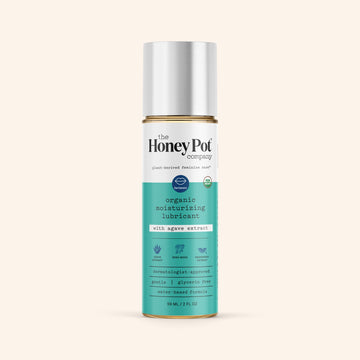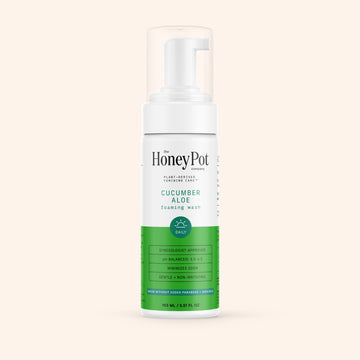Bodies can be weird but wonderful. They tend to lean more on the weird side when strong smells occur. Some scents are expected (we’ve all learned to live with deodorants and body sprays). But sometimes, they seem to come out of nowhere and have you subtly sniffing, thinking, I hope that’s not me.
Vaginas can produce some particularly interesting smells, but most of them keep to themselves. If you’re able to catch a whiff of yourself through your clothing, that’s a potent red flag that something is amiss. If you’re wondering what causes vaginal odor and how to fix it, you’re in the right place.
Let’s Talk Vaginal Odor: What’s Causing the Funk Down There?
Let’s be real. We all understand that bodies smell as part of the natural process of eating, sweating, releasing toxins, and generally living. Some smells we accept as normal, while others trigger the internal alarm that something is off.
Just like the rest of your body, your vagina is going to have its own distinct odor. This is normal. But as people with vaginas, it’s our job to raise the alarm when our natural scent morphs into something less pleasant.
After all, that’s the body trying to get your attention that something is wrong. Unusual odors can be embarrassing and stressful. Many vaginal smells are due to an underlying cause, and the scents draw attention that something is wrong.
These are the cases when it’s time to do some research, a.k.a. consult the internet to find out what’s up. Whether it’s a fishy odor, bleach smell, or something else, it may be indicating a problem. So what is the reason your vagina smells, and how can it be prevented?
There are common potential causes of a strong odor, so let’s tackle them to see what might have your honey pot smelling like a bad batch of clam chowder.
Urinary Tract Infection
Urinary Tract Infections (or UTI for short) affect roughly 150 million people each year, so they’re common issues. UTIs stem from bacteria making their way into the bladder where it doesn’t belong.
Uncomfortable symptoms like burning when urinating, frequent trips to the bathroom, and strong-smelling urine may occur. Although they’re simple to treat, you should get a UTI looked after quickly so it doesn’t spread.
Sexually Transmitted Infections
Sexually transmitted infections (STIs) can also be the cause of a strong-smelling vagina. Common STIs are chlamydia, gonorrhea, and trichomoniasis.
These can include similar symptoms like pain during sexual activity, itchiness, and foul-smelling discharge. STIs can be serious, but they can also be treated and often cured. Don’t wait to see your doctor if you suspect an STI is the cause of your woes.
Yeast Infection
Yeast infections are sometimes confused with UTIs, but instead of bacteria, yeast infections are caused by a fungus called Candida. Yeast infections are different from UTIs and STIs in that they’re not spread by sexual activity.
Instead, an overgrowth of vaginal fungus causes symptoms like an itchy vulva, odorous discharge, and vaginal pain. Your doctor will likely prescribe antifungal medications to fight the build-up of fungus.
Unbalanced PH
Bodies need a balanced PH to function normally and, you know, keep you alive. The PH level of your vagina can contribute to odors. Your vagina is a pretty acidic place, which is how it likes to remain. When your vagina’s PH falls outside of the healthy range (3.5 to 4.5 is a good balance), one of the key indicators is a strong smell.
There are a number of reasons why your vaginal PH might be off. Hormonal changes are a big one. Menstruation blood has a much higher (less acidic, more alkaline) PH, which, when sitting against the vagina (even in a pad or tampon), will change PH. Menopause and pregnancy also alter your natural PH.
Sex also contributes to PH balance. Semen is more alkaline than the vagina, so unprotected sex may be the cause of your strange smells.
In relation to PH, Bacterial vaginosis (BV) is an infection that occurs when the good bacteria in the genitals become unbalanced. Common symptoms are a fish-like smell, pain when urinating, and discharge.
Luckily, your doctor can treat it with antibiotics or vaginal cream. You can help keep your pH balanced by increasing the good bacteria in your microbiome. Include prebiotics and probiotics in your daily routine for a happy honey pot.
When Is Vaginal Odor a Concern?
Along with a funky smell, when something is off down there, you might experience connected symptoms like itching, painful urination, or vaginal discharge. These signs mean it’s time for a check-in with your gynecologist.
While vaginal infections are quite common and easy to treat, they’re still unpleasant. Do yourself a favor and start the process of restoring your vagina to health.
If you’re pregnant and experiencing any of these symptoms, it’s best to check in with your OB-GYN to ensure everything is up to code. You should always consult your healthcare provider when odd symptoms pop up.
How Can I Prevent Odors?
So, we know some vaginal odors can occur from infections or even just during your menstrual cycle because of normal PH changes. But what can you do to prevent odors? Having a funny-smelling groin area doesn’t mean poor hygiene, but you can help prevent it by following good practices with your honeypot.
Stay Hydrated
Dehydration can be another cause of a weird vaginal smell, specifically a bleach scent. To support a healthy PH balance and increase your overall wellness, drink lots of water throughout the day. It will help flush out toxins and promote a better smell down there.
Clean Smart
It’s a myth that you should be washing your vagina with strong fragrances. In fact, these can often lead to poor vaginal health because they can be drying, irritating, and packed with synthetic ingredients. At the least, mild soap will do the trick.
But your best option is to use gentle, sensitive-on-skin vulva products that are naturally derived. And remember, never douche your vagina because that unbalances PH and removes the good bacteria with the bad!
Eat Right
To support a happy microbiome, eat foods that contribute to an environment of flourishing probiotic bacteria. Fibrous foods are a great addition to your diet. Similarly, fermented foods like sourdough, yogurt, kimchi, miso, and cottage cheese can do wonders for your body’s microorganisms (gotta love those little guys).
The Secret to a Fresh-Smelling Honey Pot
It’s not always possible to avoid infections and other causes of a bad smell. However, you can follow some simple steps of good hygiene to remove the threat of odors spreading through your clothes.
A ritual that includes some healthy goodies for your vulva never hurts, either. Your vaginal flora will be giving garden vibes in no time.
Sources:
Influence of Foods and Nutrition on the Gut Microbiome and Implications for Intestinal Health | NCBI
Urinary tract infections: epidemiology, mechanisms of infection and treatment options | NCBI
Vaginal, Cervical and Uterine pH in Women with Normal and Abnormal Vaginal Microbiota | NCBI
Warding Off Recurrent Yeast and Bacterial Vaginal Infections: Lactoferrin and Lactobacilli | NCBI







